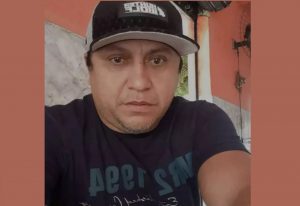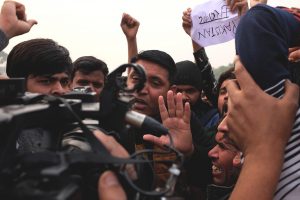As in most previous cases, this year’s Mexico’s 12th murder of journalists took place in an area that has been plagued by organized crime violence. And he victimized a professional from a local newspaper, not a major media outlet.
Antonio de la Cruz, 47, who has worked for the regional newspaper Expresso for nearly 30 years, was shot dead on Wednesday (29th) as he was leaving his home in Ciudad Victoria, in northeastern Mexico. His 23-year-old daughter was seriously injured.
With the new crime in six months, Mexico has distanced itself further from its own journalists, seven of whom were killed throughout 2021. Average of two deaths per month in 2022.
Journalist covering rural issues killed in Mexico
As with investigative reporter Peter De Vries in the Netherlands last year or Al Jazeera expert Shireen Abu Akleh in Israel this year, none of the crimes against journalists in Mexico this year involved a professional sponsored by a major journalism company.
In the country led by President Andrés Manuel Lopéz-Obrador, all deaths were reported by community media or bloggers.
This also happened in Brazil; Givanildo Oliveira of Ceará was murdered in February after reporting on the news portal that a man accused of murder had been arrested.
Read more
UNESCO world director calls for investigation to probe journalist’s death in Ceará
Mexican De la Cruz reported on rural and social problems in the city, which borders the state of Tamaulipas, which is plagued by violence and organized crime.
He was shot and killed while leaving the house with his wife and daughter. It was claimed that the attack was carried out by two people on motorcycles.
The Mexican National Association of Press Editors (SNRP) issued a statement urging the government to take action:
“We demand the prompt and expedition of those responsible for the murder of my colleague Antonio de la Cruz, and we demand adequate assurances from the federal and state governments.
journalism practice in Mexico; Freedom of expression and the lives of media workers are not guaranteed in our country,” he said.
In a written statement, the Chief Public Prosecutor’s Office stated that, taking into account the public accusations made by journalists, it ordered the Special Prosecutor for Crimes Against Freedom of Expression (FEADLE) to launch an investigation parallel to the criminal justice system to determine whether the murder was committed. De la Cruz is all about her journalism work.
According to the International Federation of Journalists, Antonio de la Cruz also served as an adviser to Citizens’ Movement lawmaker Gustavo Cárdenas, who confirmed the news to local media. De la Cruz also coordinated the political party’s communications.
The statement made by the organization included the following statements:
We demand that the authorities carry out a thorough and swift investigation to shed light on the incident and bring the journalist and his family to justice, and this sets a precedent for tackling the very high rates of impunity. There can be no freedom of expression without justice.”
Attacks on journalists continue in Mexico
The latest case of a journalist killed in Mexico was a double death. On May 9, Yessenia Mollinedo Falconi and Sheila Johana García Olivera, director and reporter of the news site El Veraz in Cosoleacaque, were shot in front of a convenience store.
According to information from the Associated Press (AP), Cosoleacaque is close to a major migrant route operated by organized crime syndicates in southeast Veracruz.
The crime took place on the same day that journalists prepared for a demonstration in Mexico City to protest the 9th crime of the year that killed Luis Enrique Ramírez Ramos in Sinaloa. It is the region where the cartel of the same name, one of the largest criminal organizations in the world, operates. The body was found in a bag by the roadside.
Ramirez was a well-known, award-winning professional with a career spanning over 40 years, working for leading Mexican newspapers and political columnist for El Debate, a regional media outlet with more than 300 employees.
government responsibilities
Mexico’s state and federal governments have been criticized by the press and organizations for failing to prevent the killing of media workers or conduct adequate investigations to pinpoint those responsible for the crimes.
In the latest Global Press Freedom Rankings by Reporters Without Borders (RSF), the country was ranked 127 out of 180 countries surveyed, with rising violence making Mexico the deadliest country for journalists.
Read more
Brazil was ranked 110th in the 2022 Press Freedom Index, which marks the ‘new era of polarization’.
President Lopéz-Obrador speaks aggressively to the press at his public demonstrations, especially when there is some criticism of his government or family members. Frequent insults include accusations that the media are defending interest groups and that journalists are mercenaries.
While the federal government is not held responsible for crimes against journalists in Mexico, the rhetoric appears to encourage intolerance towards the press.
Read more
Bolsonaro family intensified attacks on press in 2021, RSF report
For the nonprofit Global Initiative for Transnational Organized Crime, while organized crime groups are responsible for most of the killings, “it would be a naive misrepresentation to think they are solely responsible for these attacks.” .
In an analysis of the Mexican situation published in February, the organization said:
“These murders do not happen in a vacuum; they are part of a scenario of political violence in which crime and state actors are constantly bargaining for power.
Authorities exploited the narrative that held cartels responsible for violence in Mexico and stripped the state of its important role in undermining journalists’ safety and citizens’ right to press freedom.
But most of the threats against media workers actually come from government officials.”
According to the organization, The concept of press freedom did not exist in Mexico until the 71-year regime of the Institutional Revolutionary Party (PRI) ended in 2000.
“The PRI’s control over power promoted a monopoly over mass media ownership used to disseminate an ‘official’ version of the truth – essentially propaganda. Any media company that challenged the government’s official narrative was silenced. If independent media are to survive, self-censorship has become the norm.
Over the past two decades, changes in the country’s political dynamics have affected media ownership and agendas. The NGO points out that in what it understands to be a marked trend towards greater tolerance for dissent, new transmission channels are making the industry more competitive.
At the same time, organized crime has expanded and the country is home to more crime actors than ever before with increasing influence at the local level.
“Where journalists in Mexico are most at risk is in the local criminal administration area, where criminal organizations penetrate municipal institutions in an environment of collusion.
read it too
source: Noticias
[author_name]


